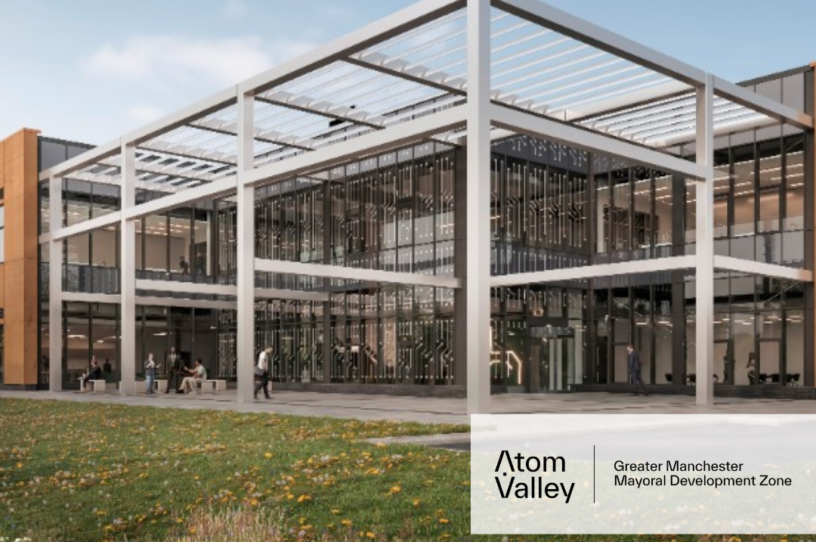Atom Valley will be partner in a national research hub, designed to support the UK’s transition to a circular manufacturing ecosystem.Led by the University of Birmingham and part of UK Research and Innovation’s ‘Manufacturing research hubs for a sustainable future’ programme, the hub has received £11m from EPSRC and in funding over the next 7 years.The hub will be named the EPSRC Manufacturing Research Hub in Robotics, Automation & Smart Machine Enabled Sustainable Circular Manufacturing & Materials (RESCu-M2) and will focus on two grand challenges: transforming the sustainable use of critical materials, and improving the productivity of ‘Re-X’ manufacturing processes.
Announcing the funding, EPSRC Executive Chair Professor Charlotte Deane said: “Given the scale and importance of the UK’s manufacturing sector we must ensure that it is able to benefit fully from advances made across the research and innovation ecosystem.
“With their focus on innovation and sustainability the advances made by the hubs will benefit specific sectors, the wider manufacturing sector and economy, as well the environment.”
The RESCu-M2 hub aims to harness advances in AI and intelligent automation to create a new manufacturing ecosystem that can promote cost-effective circular resource use.
Rochdale Development Agency will be the lead partner in the programme for Atom Valley, which is a Mayoral Development Zone and part of a plan to create a world class cluster of advanced materials and manufacturing across Bury, Oldham and Rochdale.
Other partners in the Hub include the Universities of Strathclyde, Leeds, Sheffield and Brighton, as well as Loughborough University, the Manufacturing Technology Centre, West Midlands Combined Authority, West Yorkshire Combined Authority and Brighton & Hove Chamber of Commerce. These partners will work alongside Atom Valley to support the development of ‘spokes’ from the hub, around which opportunities for further investment can emerge.
Professor Samia Nefti-Meziani OBE, Director of the Birmingham Robotics Institute, is the Hub director. She said: “We need to adopt radical new approaches in manufacturing that move away from a focus on producing new products, and then disposing of them when they reach their ‘end of life’.
“Instead, we should be focusing on processes that prolong the useful life of products, particularly those including critical materials such as rare earth elements.
The environmental impact from the global consumption of engineering materials is expected to double in the next forty years, while annual waste generation is projected to increase by 70% by 2050. The funding from UKRI is designed to set out the circular economy requirements and sustainability goals set out by the UK Government.
The hub brings together an interdisciplinary team, including experts in manufacturing, robotics, AI and automation, materials science, chemical engineering, chemistry, economics and life cycle assessment. It will focus initially in four flagship areas: energy, medical devices, electric drives and large structures. Researchers will investigate:
• Smart processes for disassembly, remanufacturing, separation, and recovery of critical products, components, and ultimately materials.
• Sensing and analysis processes to track and determine the state of critical materials throughout their life.
• Design methodologies for circular manufacturing.
• Testing and validation methods to certify the remaining useful life of crucial products, components, and materials.
• Circular Re-X business models.
Neil Emmott; Leader of Rochdale Borough Council:
“Rochdale Development Agency, the regeneration and inward investment arm, continues to works tirelessly with key strategic partners in Bury, Oldham, UK Research and Innovation and academic institutions nationally to make the Mayor’s vision to build a world class advanced materials and manufacturing cluster in Atom Valley a reality.
The RDA, the lead in this programme for Atom Valley, a key spoke in the hub, will focus, with partners, on initiatives that include reuse, repair, refurbishment, remanufacturing, and recycling. The hub will enable technologies that will significantly reduce waste and promote the efficient use of critical materials. The initiative will continue the work already underway within CEAMS, Centre of Expertise in Advanced Materials and Sustainability working along key partners such as the MTC, Manufacturing Technology Centre, which provides innovative manufacturing ideas, manufacturing system solutions, training and skill development.
The RESCu-M2 hub will cement Atom Valley as a place for innovative materials and machinery businesses and we look forward to supporting Rochdale businesses and those choosing to locate into the borough.
Councillor Eamonn O’Brien Leader of Bury Council:
The largest site on Atom Valley is Northern Gateway. This site can deliver 1.2million square metres of employment land and is central to the delivery of Bury’s Economic Strategy. With Atom Valley being a spoke in this programme over the next 7 years, we look forward to working with partners in this programme to create a more sustainable, competitive, inclusive, and resilient local economy.
Councillor Arooj Shah, Leader of Oldham Council:
“Oldham is at the forefront of sustainable economic development thanks to the council being the first local authority in the UK to adopt Green New Deal Strategy.
“I’m delighted that businesses in our borough will be able to benefit from this programme.
“It will help deliver a real economic boost and aligns with our strategy to ensure Atom Valley is a world leading site with sustainable manufacturing at its core.”
Professor Adam Tickell, Vice Chancellor of the University of Birmingham: “The aim of RESCu-M2 is to find and help implement integrated solutions that will drastically reduce the environmental impact of high-value products and make significant savings in CO2 emissions annually. By taking an innovative and holistic approach to these challenges, the UK could become a world leader in circular manufacturing and we are delighted to be playing our part.”







